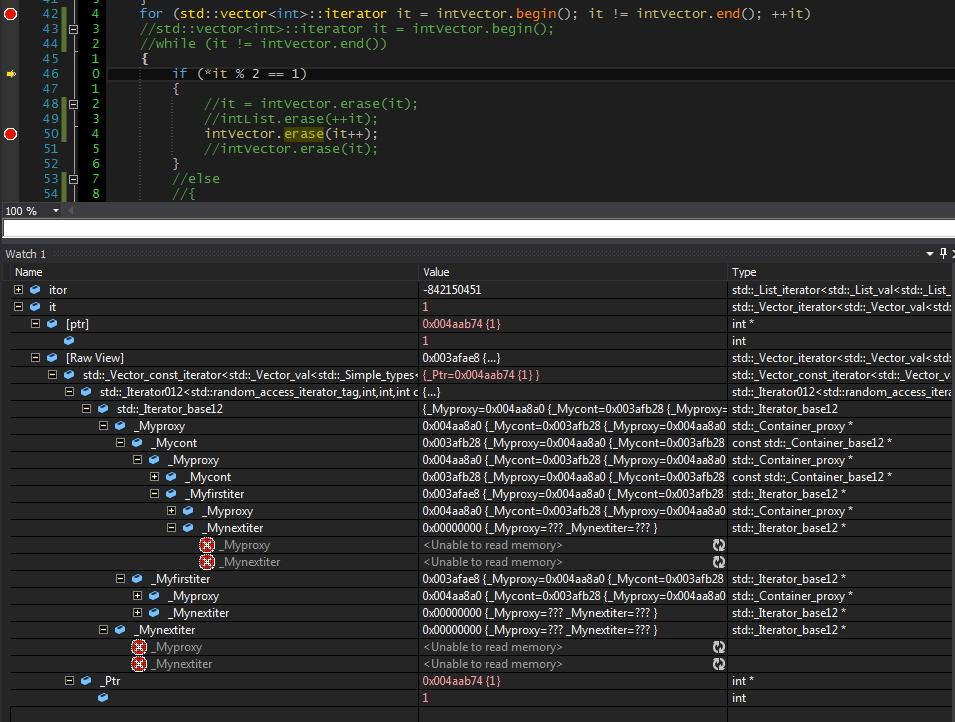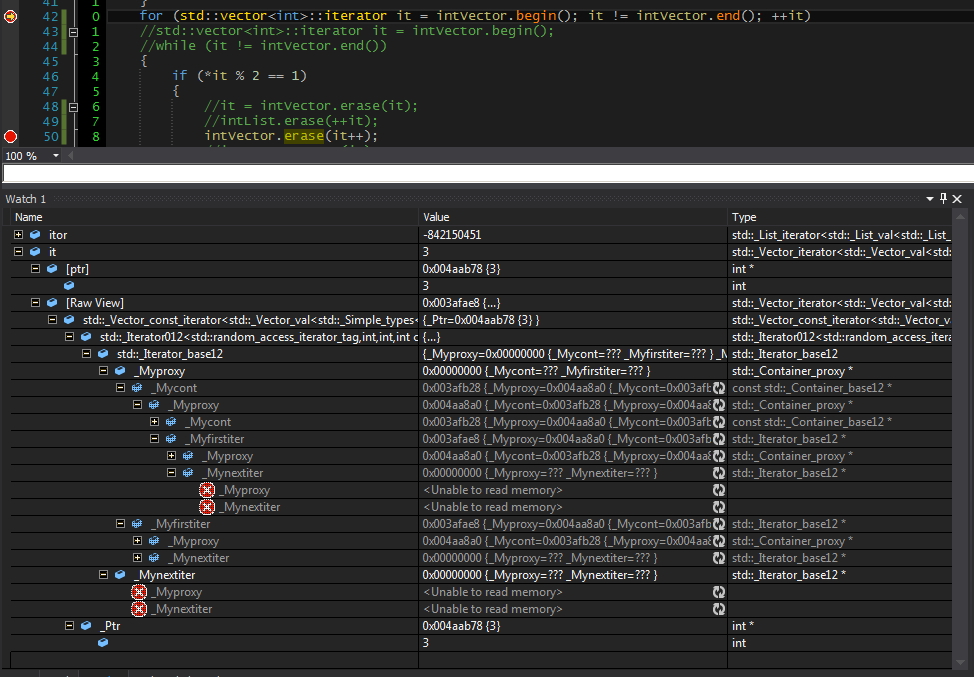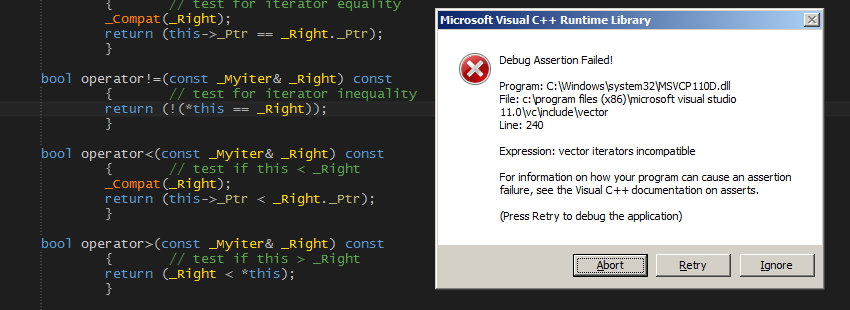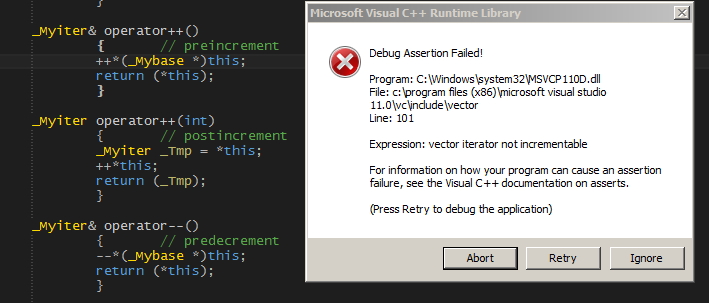对于c++中有关iterator的学习以及几个std方法的理解
2014-05-30
以下仅是我在目前的能力下对相关知识的理解,也许有很多地方存在谬误。以后我会不断的修正。 因为不清楚一些c++中的概念词的中文译名,所以暂时以英文单词取代。
起因
最近一直在想如何更好的解决有关人物移动速度buff的恢复。 在StatckExchange找到了一篇相关的帖子。虽然有关的问题我已经有了想法(这个稍后再写),里面提到的有关在遍历技能列表的方法,移除超过技能使用时间的方法令我学习到了std里面的几个函数,同时复习了std::iterator的知识。
skill buff相关代码
首先是buff的Struct
struct Buff
{
enum Type
{
Type_BonusMalus,
Type_Multiplier,
};
Type type;
int value[STAT_COUNT];
float timeLeft; // FLT_INFINITY = permanent
void updateAndApply(float dt, int* stats)
{
for (int i=0; i<STAT_COUNT; ++i)
{
switch (type)
{
case Type_BonusMalus: stats[i] += value[i]; break;
case Type_Multiplier: stats[i] *= value[i]; break;
}
}
if (timeLeft != FLT_INFINITY)
{
timeLeft -= dt;
}
}
bool hasTimedOut()
{
return (timeLeft <= 0.0f);
}
};
然后是更新和使用buff
void updateAndApplyBuffs(float dt, int* stats)
{
// set base stats
setToBase(stats);
std::list<Buff>::iterator it;
// apply multipliers first
for (it = buffList.begin(); it != buffList.end(); ++it)
{
if (it->type == Buff::Type_Multiplier)
it->updateAndApply(dt, stats);
}
// then apply bonuses/maluses
for (it = buffList.begin(); it != buffList.end(); ++it)
{
if (it->type == Buff::Type_BonusMalus)
it->updateAndApply(dt, stats);
}
// remove buffs that timed out
// SuperCool® STL stolen from http://stackoverflow.com/a/596708/1005455
buffList.remove_if(std::mem_fun(&Buff::hasTimedOut));
} 最后一句我不明白
buffList.remove_if(std::mem_fun(&Buff::hasTimedOut));
根据作者的介绍,他是援引于另外一个提问的解答.
另一个提问
这个提问问的问题很类似,既是在update列表项的同时,删除update过的item。
提问者给出的代码是:
for (std::list<item*>::iterator i=items.begin();i!=items.end();i++)
{
bool isActive = (*i)->update();
//if (!isActive)
// items.remove(*i);
//else
other_code_involving(*i);
}
items.remove_if(CheckItemNotActive); 而这会导致i++时出现报错:
“List iterator not incrementable”
我理解的原因
首先,就像std的作用是使人们可以方便的处理各种类型的数据一样,itorator的作用是遍历container里的所有数据,而无需指定数据类型(type)。所以不同的container的itorator所指向的对象是不一样的。
有的是object,有的是pointer。【C++ Primer Plus,P995】
*疑惑:对于itorator作为pointer我能理解,但是作为object的形式我还不明白。
通过debug的时候查看itor得知,在List中,itor是一个pointer, 指向一个包含prevLink, nextLink, 和value的Node。在list.erase(itor)之后,这个Node失去了作为itor的功能。(至于变成了什么,还不懂。但是通过在watch里的观察,它此时的值与list.end()一致。)而list.erase(itor)本身所return的,是下一个element的地址。
所以有:
std::list<int> intList;
for (int i = 0; i < 10; ++i)
{
intList.push_back(i);
}
for (std::list<int>::iterator i = intList.begin(); i != intList.end(); ++i)
{
if (*itor % 2 == 1)
{
intList.erase(itor++);
// or itor = intList.erase(itor);
}
else
++itor;
}
而其中的
intList.erase(itor++); 正是利用了 int++ 首先copy一份(valuation),返回copy之后再对目标加1的特性(伪代码):
copyObj = *this;
*this += 1;
return copyObj; **(所以,普遍认为在c++中,一般情况下使用++int比较有效率。)**
但是需要注意的是,上面的代码还应该改为while loop, 不然每次会跳过一个item。 而且使用itor = intList.erase(itor) 更为安全。因为如果把List改为Vector的话,intList.erase(itor++) 会导致 “iterator is incompatible” 的错误:
但是在对vector的测试中,即使是intList.erase(itor++)也会出错(“iterator is incompatible”):
std::list<int> intList;
std::vector<int> intVector;
for (int i = 0; i < 10; ++i)
{
intVector.push_back(i);
}
std::Vector<int>::iterator itor = intVector.begin();
while (itor != intVector.end())
{
if (*itor % 2 == 1)
{
itor = intVector.erase(itor);
intVector.erase(itor++);
}
else
++itor;
} 至于出现"iterator is incompatible"错误的原因,下面有人提到是因为: Vector使用array来组织信息,在其中一个item被移除的时候,它会将后续的items向左移动,填补空间。 但是我不明白的是,根据debug观察,当itor=1时,
if (*itor % 2 == 1)
{
intVector.erase(itor++);
} 移除1之后,itor的值的确变成了3(因为2向左移,同时itor++,所以跳过了2)。那么情况因该与for loop中类似,每次循环跳过一个item才对,为什么会出错呢?
####debug中对于内存地址的观察 itor==1的时候,[ptr]:0x004aab74{1}。

执行intVector.erase(itor++)之后,[ptr]0x004aab78{3}。此时,[ptr]:0x004aab74应该成为了2。

注意上图中,_Myproxy变为nullprt。
此时,如果是使用whie loop。返回while loop 的比较阶段,进行比较时,出错

如果是使用for loop,返回for loop的迭代阶段,进行++itor时,出错

- 疑惑: Vector中使用 intList.erase(itor++) 出现”iterator is incompatible”错误的原因可能是因为itor指向的结构发生了变化?
##对于“如何删除升级后的技能”的解答 对于这个如何在update之后马上从技能列表中删除此技能的问题,Mike给出的解答是:
// Note: Using the pre-increment operator is preferred for iterators because
// there can be a performance gain.
//
// Note: As long as you are iterating from beginning to end, without inserting
// along the way you can safely save end once; otherwise get it at the
// top of each loop.
std::list< item * >::iterator iter = items.begin();
std::list< item * >::iterator end = items.end();
while (iter != items.end())
{
item * pItem = *iter;
if (pItem->update() == true)
{
other_code_involving(pItem);
++iter;
}
else
{
// BTW, who is deleting pItem, a.k.a. (*iter)?
iter = items.erase(iter);
}
} 但是解答者还给出了更好的解决方案,既是本文要记录的有关std的知识点:
// This implementation of update executes other_code_involving(Item *) if
// this instance needs updating.
//
// This method returns true if this still needs future updates.
//
bool Item::update(void)
{
if (m_needsUpdates == true)
{
m_needsUpdates = other_code_involving(this);
}
return (m_needsUpdates);
}
// This call does everything the previous loop did!!! (Including the fact
// that it isn't deleting the items that are erased!)
items.remove_if(std::not1(std::mem_fun(&Item::update))); ## 知识点 通过查资料,大概了解了这里用到的几个函数,试着写下来自己的简单理解:
std::mem_fun
返回一个函数体(function object)里面含有的成员函数(member function),然后返回结果。在此,如果已经update过了,返回false。
std::transform
std::mem_fun的实现涉及std::transform。 它的作用是遍历参数中的container里的element,将此作为参数中的函数体的参数,依次执行,得到并返回结果。 例子:
int op_increase (int i) { return ++i; }
// example of std::transform
void std_transform()
{
std::vector<int> foo;
std::vector<int> bar;
// set some values:
for (int i=1; i<6; i++)
foo.push_back (i*10); // foo: 10 20 30 40 50
bar.resize(foo.size()); // allocate space
std::transform (foo.begin(), foo.end(), bar.begin(), op_increase);
// bar: 11 21 31 41 51
// std::plus adds together its two arguments:
std::transform (foo.begin(), foo.end(), bar.begin(), foo.begin(), std::plus<int>());
// foo: 21 41 61 81 101
std::cout << "foo contains:";
for (std::vector<int>::iterator it=foo.begin(); it!=foo.end(); ++it)
std::cout << ' ' << *it;
std::cout << '\n';
} #### std::not1 返回相反boolean值 #### std::remove_if 移除符合条件的elements。 *[std::remove_if在c++11里的实现][]:
enter code hertemplate <class ForwardIterator, class UnaryPredicate>
ForwardIterator remove_if (ForwardIterator first, ForwardIterator last, UnaryPredicate pred)
{
ForwardIterator result = first;
while (first!=last) {
if (!pred(*first)) {
*result = std::move(*first);
++result;
}
++first;
}
return result;
} #### std::move 获取参数的rvalue reference,然后将其转为xvalue。
std::string str = "Hello";
std::vector<std::string> v;
v.push_back(std::move(str)); 将string转移到Vector v里面而避免copy的过程。此时str=""。 但有趣的是,如果继续
// string move assignment operator is often implemented as swap,
// in this case, the moved-from object is NOT empty
std::string str2 = "Good-bye";
std::cout << "Before move from str2, str2 = '" << str2 << "'\n";
v[0] = std::move(str2);
std::cout << "After move from str2, str2 = '" << str2 << "'\n"; output: Before move from str2, str2 = 'Good-bye' After move from str2, str2 = 'Hello'